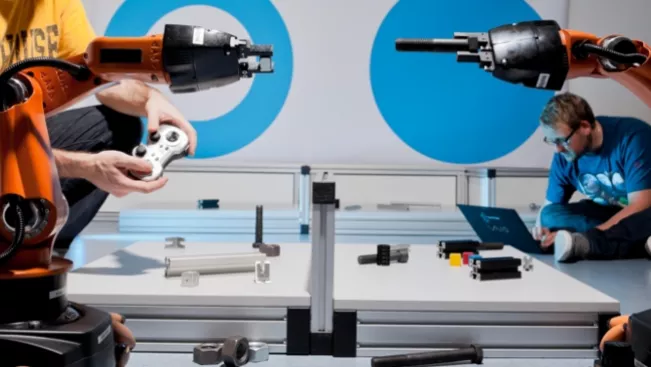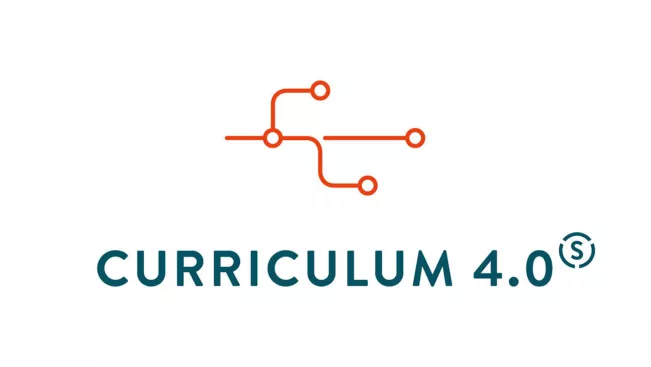Research at the university
Research Database: Projects
Forschungsprojekte (191)
Very often, objectives such as accuracy and precision of robot behaviours are not the only requirements imposed on them. For completing tasks defined in dynamic and unstructured environments/settings, it is necessary that the employed software additionally enables high degrees of efficiency and robustness in a robot, given the system’s mechanical structure and actuation capabilities. It has been shown that the advanced efficiency and robustness of humans and animals, in performing the locomotion and manipulation tasks, are enabled by a control paradigm that exploits (i.e. takes the advantage of) their natural dynamics. Those insights motivate us to consider the same control paradigm, i.e. embrace natural dynamics of the robotic systems while addressing the problem of enabling such advanced performance for our robots. Doctoral student Djordje Vukcevic works on developing reusable control methods for exploiting robot's natural dynamics in unifying, explicit, general and real-time applicable ways. Those reusable solutions will provide a strong step towards advanced and computationally efficient control algorithms and architectures, and their automatized and formal development.
The potentials and effects of digitalisation today encompass all areas of human and social activity. Universities are therefore responsible for enabling their students to develop competences that not only include the competent use of digital technologies, but also the ability to assess the potential and effects of digitisation in society and the world of work, to actively and reflexively shape digitisation processes and to keep pace with the rapid dynamics of change. In 2019/2020, the state of North Rhine-Westphalia developed the Curriculum 4.0.nrw funding line, which is intended to support the Hochschule Bonn-Rhein-Sieg in exploiting the opportunities of digital teaching, among other things. In the Department of Electrical Engineering, Mechanical Engineering and Technical Journalism, this funding line will be used to further develop the Master's programme in Sustainable Engineering Sciences, which addresses the funding line's thematic areas such as technical innovation and digitalisation.
Project management at the H-BRS
Prof. Dr Marco JungDuring the planning process of prefabricated houses the manufacturers want to provide their customers a realistic impression of the interior design with the aim to reduce costs and avoid misunderstandings. The objective of the research project MateDiS is to capture and visualize materials and their specific surface properties to provide a genuine look and feel of future houses. A hardware setup consisting of several cameras and light sources will be build to gather the specific material properties under different viewing and illumination conditions. A single material results in hundreds of images, therefore compression techniques are evaluated and implemented, to reduce the data size and make it usable for the given memory conditions. Implementation of less complex materials is intended for visualization on non-desktop environments like tablet PCs. Like its predecessor project IVAB, MateDiS uses our own path tracer “Spark” for the complex global illumination calculations, which will be extended to use the captured high-quality materials. The materials will be stored in a cloud database to make them easily available to the target audience.
The shortage of skilled professionals is a growing problem all over the world and has a serious impact on the industry. Thus, companies are willing to train their own professionals for the company-related tasks. They are even willing to provide continuing education for their long-term employees. Especially in the area of machine engineering, it is a standard procedure to perform the training in form of on-site instructions on the corresponding machinery. Often, experienced instructors perform the training and share their knowledge with the students during a live-demonstration. The transfer of knowledge can be complicated by the fact that multiple resources in terms of people and hardware have to be brought together: Some devices may only exist in a very limited number and need to be used for daily production, which makes it difficult to schedule a training session; trainees may also be required to travel to the place of operation because the company is located at multiple sites; the experienced professionals who are serving as instructors are often integrated into various critical operations regarding the companies daily business and thus are only available for limited periods of time. The incentive of the project is to find out how innovative approaches and methods from the fields of Augmented Reality and Virtual Reality (AR/VR) can be used to enhance training procedures for companies to ease the above mentioned burdens. A multicamera system consisting of various hardware and software components is being developed, which enables remote training by recording and streaming a live training situation from multiple view points. By integrating modern interaction concepts as well as AR/VR visualisation techniques, we seek to improve the user experience for the remote training. The project developments are iteratively being examined and evaluated with relevant test scenarios resulting in an ongoing project evaluation. This project is a part of Campus to World.
The aim of Garrulus is to develop a fast, reliable and cost-effective method for the reforestation of damaged German forest areas. To this end, it is planned to design and build a prototype for an unmanned aerial vehicle (UAV) that is capable of surveying the damaged terrain, accurately quantifying the extent of the damage and applying new seeds at suitable locations for reforestation.
Die Hochschule Bonn-Rhein-Sieg - einfach ausgezeichnet. Studieren Sie bei uns! Es erwartet Sie ein praxisorientiertes Studium auf der Basis aktueller Forschungsergebnisse.
Sustainable educational institutions The creation and improvement of educational opportunities is essential for the sustainable development of a region. The implementation requires the cooperation of academic and non-academic educational institutions. A four-day symposium on this topic will take place in Sardinia, a biodiversity hotspot, in October 2021 and will contribute to the establishment of a dialogue platform. Prof. Dr. Wiltrud Terlau from the International Centre of Sustainable Development (IZNE) at Bonn-Rhein-Sieg University of Applied Sciences (H-BRS) is organising the meeting together with the Department of Agriculture of the University of Sassari (UNISS) and other partners.
Project management at the H-BRS
Prof. Dr Wiltrud TerlauDieses Vorhaben strebt eine deutliche Qualitätssteigerung deutscher Sicherheitsprodukte durch Anhebung der Prüfmethoden in akkreditierten Prüflaboren auf den neuesten wissenschaftlichen Stand an. Dazu werden Ansätze zur Seitenkanalanalyse aus der wissenschaftlichen Literatur für den praktischen Einsatz in Prüflaboren weiterentwickelt, um die in Sicherheitsevaluierungen angewandten Prüfverfahren um Penetrationstests für fortgeschrittene Angriffe zu ergänzen. Die bisher nur rein akademisch betrachteten Verfahren werden dazu bzgl. ihrer Praxistauglichkeit in Prüfverfahren untersucht und anschließend hocheffizient implementiert. Es werden alle fortgeschrittenen Verfahren für passive Seitenkanalangriffe (Analysen höherer Ordnung, mit Templates, stochastischen Methoden und Mutual Information Analysis) und aktive Seitenkanalangriffe (elektrische und optische Fehlerinjektion) betrachtet. Der Mehrwert der neuen Methoden wird praktisch an Testobjekten evaluiert und mündet in die nachhaltige Entwicklung praxisgerechter Mess- und Analysesysteme für den Prüfstellen-Einsatz. Dieses Vorhaben soll die Prüfstandards bei Sicherheitsevaluierungen in den deutschen Prüflaboren merklich anheben und damit die internationale Wettbewerbsfähigkeit hochsicherer Produkte möglichst vieler Industriezweige fördern.
Das Verbundprojekt SCAAS ist ein Kooperationsprojekt von Automobilzulieferern und Forschungseinrichtungen, das sich der Entwicklung von Sicherheitsmechanismen für die deutsche Automobilindustrie gewidmet hat. Das Ziel des Vorhabens ist es, die Anfälligkeit von Automotive-Prozessoren für Methoden der Seitenkanalanalyse zu bestimmen und speziell für den Automobilbereich geeignete Gegenmaßnahmen zu identifizieren, zu implementieren und derer Effektivität zu bewerten. Sponsoren: BMBF, IT-Sicherheitsprogramm
In diesem Projekt wird der symmetrische Chiffrierstandard Advanced Encryption Standard (AES) in einer Hardwareschaltung mit speziellen Mechanismen implementiert, die einer physikalischen Kryptoanalyse zumindest bis zur ersten Ordnung entgegenwirken.
Contact Points
Centre for Science and Technology Transfer (ZWT)
Room
F 405
Vice President Research and Young Academics
Campus
Sankt Augustin


